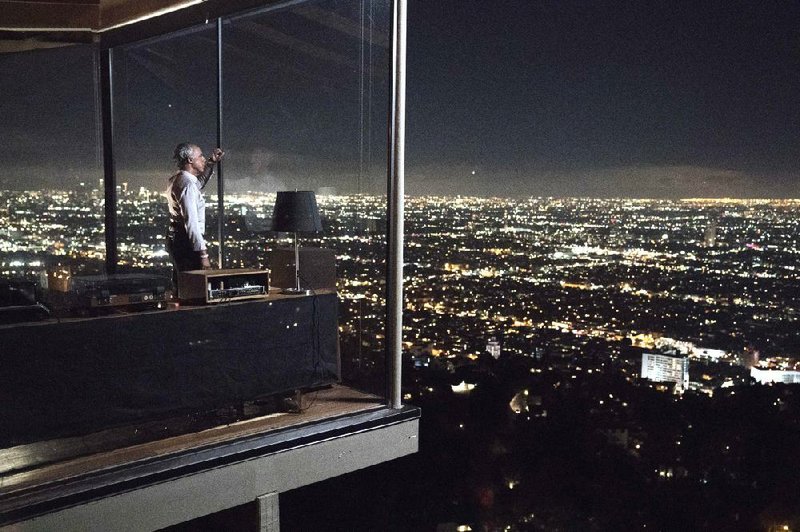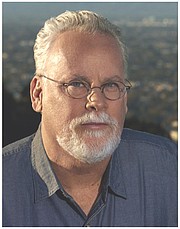It's not often that you hear a last name like mine casually mentioned on TV.
So my younger brother Lonnie's ears perked up during an episode of Bosch when he heard an LAPD internal affairs (IA) investigator ask Det. Hieronymus "Harry" Bosch (Titus Welliver), "Familiar with the Lybarger?"
My brother turned on the captioning and played the line again, and when our name was spelled correctly, we both started researching and found out that in 1980, a Los Angeles vice officer named Michael Lybarger refused to take part in an IA inquiry and lost his job.
Six years later, the California Supreme Court in Sacramento ruled that he had not adequately been informed of his rights. Michael Lybarger got his job back along with full back pay, interest, attorney fees minus any wages he made at another job. Now, L.A. cops must be informed of their "Lybarger" rights.
"I was going to ask if you any were any relation to Michael," says novelist-producer-screenwriter and Bosch creator Michael Connelly. Speaking by phone from Florida, the author seemed pleasantly surprised that my sibling and I were so eager to find out why our name was in the show.
"It's interesting you would do that because most people would say, 'Oh, (the characters) must know somebody named Lybarger because they used his name. You stumbled into how accurate we try to be."
That's not an isolated example.
DOZENS OF BOOKS
When Lonnie reads Connelly's novels like The Night Fire, Blood Work, The Poet, The Lincoln Lawyer or any of the dozens of books about Bosch and Los Angeles crime, he checks them against maps of the City of Angels and usually finds them to be a close match. It probably helps that Connelly used to be a crime reporter for the Los Angeles Times.
Bosch, which has just launched its sixth season on Amazon Prime, is loaded with authentic LAPD jargon and locations that you can visit for yourself if you're as brave as Bosch himself. It helped that Amazon had done a brisk business with his books.
"I was in the right place at the right time," Connelly says. "Amazon was very new at creating shows, and they came to me about the show. This was eight years and, and I was 20-plus books into my career, and I didn't need any money from Hollywood, so they had to do it the way I wanted to do it, or I'm not interested in doing it.
"It had to be shot in LA, even interiors because I'd been involved in a show (Level 9) in the '90s that was supposed to be an LAPD, show but they filmed it in Vancouver to save money, and that show got canceled after seven episodes because it just wasn't realistic. The coin of the realm in my books is to be as realistic as possible. I'll be the first to say I don't get everything right. I'm not a slave to accuracy. I'm a slave to drama, but accuracy is right after that."
When characters in Bosch converse, you'll hear a barrage of acronyms like "RHD" (for Robbery Homicide Division) because LAPD officers already know what it means. After Googling the term, I understood why Jimmy Robertson (Quentin Tarantino veteran Paul Calderone) was so eager to resolve a case. He's itching for a long-awaited promotion to that branch.
'PAY ATTENTION'
"I carry that into the books as well. People speak in shorthand, especially when they know what they're talking about. You don't spell out acronyms. I get questions in my books all the time. Do we want to say what this is? If it's in a quote or in conversation, I'm not going to make the conversation unrealistic. One of the things I'm proud about is that they carried that philosophy into the show. You've got to pay attention to the show, and even if you're paying attention, you might not get everything in the moment. Across the span of the show, it will come together," he explains.
In his true-crime podcast Murder Book and over the phone, Connelly is quick to note that much of the pleasure of reading about Bosch's cases or watching them on TV is that he takes risks most cops wouldn't do. After all, Bosch's half-brother "Lincoln Lawyer" Mickey Haller has a radar for holes in a prosecution's case.
"Harry Bosch is a guy who would walk up to the line and put one foot over it but won't put both feet over it. Most of the people I deal with and research and who are close friends and that do Harry's job in real life, they don't even go up to the line. That is not as dramatic in fiction or onscreen entertainment, but it's noble that they do that. Their job would be easier if they crossed the line," he says.
"A defense attorney would reveal the issues with how you gathered that evidence."
HAPPY WITH THE FILMS
Connelly is happy with the films made from Blood Work and The Lincoln Lawyer, even though he had little input in how they were made. From hearing Connelly talk about the show, he talks more like a contributor than a mastermind or a disgruntled creator seeing his work butchered. He's a fan of The Sopranos and was happy to work with two former writers from that series on Bosch. This season's arc involving Bosch's partner Jerry Edgar and his Haitian roots came about from factors other than the books.
"When you have good actors who can carry this stuff you just marvel at it," he admits. "A lot of the backstory is the actor Jamie Hector's real story. He has a Haitian background. He was born in the United States, but his parents were immigrants, and half of his brothers and sisters are still in Haiti. We were able to tap into that."
He adds, "We're aware of drama and how you have to throw in disappointments to the viewer. We were heading toward the end of (Det. 'Barrell' Johnson), but he's a guy who brings a lot of humor to the show and then the actor (Troy Evans) is such a nice guy. We started thinking. Do we really want to have a set where Troy is not hanging around, giving us pep talks and old stories? He probably doesn't really know how close he came to not being on the show anymore to carrying one of the main stories this season."
BAD GENES
During our 38-minute conversation, Connelly reminds me that he hasn't been a journalist for a quarter century, but his new novel Fair Warning, follows reporter Jack McEnvoy (the protagonist in Connelly's The Poet) as he investigates a series of murders involving the dark web and genetic testing.
In the novel and in Murder Book (which starts its next season in June), Connelly explores how DNA has been a powerful tool for solving crimes, exonerating innocent suspects, connecting people with their ancestors and making medical advances. While the science behind it can be impressive, the loosely regulated labs pose a danger to people in McAvoy's Los Angeles and in the real world.
"I don't write about Jack that often. It's been three times over 20-some years. Usually what inspires me to write about Jack is some kind of technological intrigue that catches me personally, using the idea that for every great advancement, there's going to be some kind of villain trying to turn it against us or use it for nefarious reasons," Connelly says.
"What happened in this case, and I can't remember the source, I saw a story last year where the Pentagon had issued a directive to military personnel not to give their DNA to any of these analytical heritage sites (like 23andMe.com) because of concerns over the security of the DNA. That's all it was, that little blip of a story just really intrigued me. I started looking into who's monitoring this stuff, and that's how books start for me."
When I inform him that Lonnie and I still don't know if Michael is in our family, he replies, "It's probably likely because L.A. was a destination place. A lot of people came from elsewhere, especially in the South. I was going to suggest you do a DNA thing, but if you read my book, I'm not sure I'm suggesting that anymore."
EXTENDED UNIVERSE
McEnvoy works for the real-life nonprofit news site FairWarning.org, and the site's founder and editor Myron Levin now lives in McEnvoy's fictional world and our own. They are part of an L.A.-based panorama that includes Bosch, Mickey Haller (played in the film by Matthew McConaughey), detective Renee Ballard and FBI profiler Terry McCaleb (played in the movie of Blood Work by director Clint Eastwood).
Throughout Connelly's oeuvre, Bosch and Haller run into each other as they did in his last novel The Night Fire. It's sort of like Spider-Man getting advice from Tony Stark in a Marvel comic.
Connelly recalls, "I love that myself, the interwovenness of the books and the TV show to a little bit of an extent. That was obviously not the plan. You get one book published, and then you hope you can get a second one, but eventually, I knew I'd reached a point where I had some years ahead of me before the carpet might be pulled out from underneath me. At some point, I realized I should connect all this stuff. It's an ecology of Los Angeles. A lot of the characters would move in the same plane. Some of it's obscure, but if I had to do a chart with wool and nails on the wall, I could connect all the books."
MovieStyle on 05/29/2020

